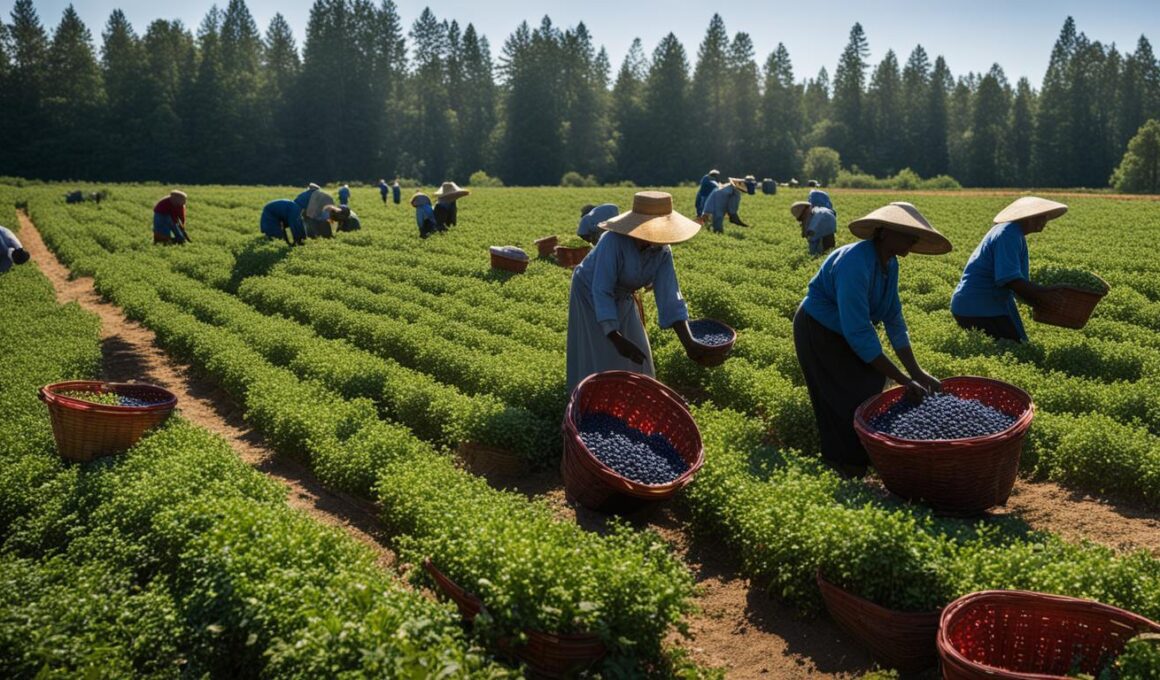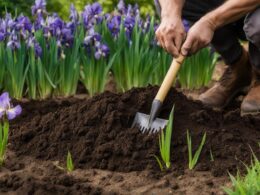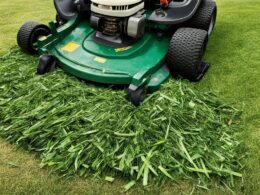If you’re a fan of blueberries, you’re probably wondering when is the best time to enjoy these delicious fruits. Blueberries typically ripen between late July and mid-August, making summer the perfect season for indulging in their sweet and tangy flavor. But how do you know when they’re ready to be picked?
When it comes to picking blueberries, it’s important to wait for the right moment. While blue or purplish-blue berries may seem ripe, it’s recommended to give them a couple of extra days to fully mature. Bigger berries tend to have a sweeter flavor, so waiting a little longer will enhance your blueberry experience.
The ripening process can vary depending on factors such as climate and variety. However, there are a few key indicators that can help you determine if your blueberries are ripe for picking. When gently touching the berries, if they easily fall off the stem, it’s a sign that they’re ready to be harvested. Additionally, the color of the berries is an important visual clue. Look for a deep blue or purple hue, as this indicates ideal ripeness.
Harvesting blueberries at the right time is crucial to ensure peak flavor and freshness. Whether you plan to use them in pies, smoothies, or simply enjoy them on their own, picking ripe berries will guarantee the best taste. So mark your calendars for the prime blueberry season and get ready to savor these little bursts of fruity goodness!
Tips for Harvesting Blueberries
When it comes to harvesting blueberries, there are a few important tips to keep in mind to ensure you pick the best berries and handle them properly. Follow these expert tips to make the most of your blueberry picking experience:
- Pick in the morning: Harvest blueberries in the early morning when the berries are cool and firm. This is when they will have the best flavor and texture.
- Gentle touch: Use a gentle touch when picking blueberries to avoid damaging the fragile berries. Simply pluck them directly from the stem without squeezing or pulling too hard.
- Avoid bruising: Handle blueberries with care to prevent any bruising. Blueberries are delicate fruits and can easily become bruised if mishandled.
- Choose ripe berries: Select only ripe berries that easily fall off the stem with a gentle touch. Ripe blueberries will have a deep blue or purple color, indicating their sweetness and maturity.
- Clean hands: Before picking blueberries, ensure your hands are clean. This helps maintain the cleanliness and flavor of the berries.
- Avoid picking unripe berries: Be selective and avoid picking blueberries that are still slightly red or green in color. These berries will not ripen further once picked and may lack the desired sweetness.
By following these harvesting tips, you can ensure that your blueberries are picked at their peak and handled properly, retaining their flavor and freshness. Now that you know how to harvest blueberries, let’s explore the next step: storing and freezing them for future use.
Storing and Freezing Blueberries
After harvesting blueberries, it’s important to handle and store them correctly to maintain their freshness and quality. Blueberries can be stored in the refrigerator for approximately two weeks. It’s best to store them unwashed and in a shallow, open container to prevent them from becoming overripe or moldy.
If you need to store blueberries for a longer period, they can be frozen for up to a year. To freeze blueberries, spread them out on a cookie sheet until they’re frozen solid, and then transfer them to a freezer-safe container or bag. Before using frozen blueberries, rinse them in cold water to defrost them.
It’s important to note that washing blueberries before storing them can cause them to mold quicker, so it’s recommended to wash them only when they’re about to be used. By properly storing and freezing blueberries, you can enjoy their fresh taste and nutritional benefits throughout the year.
Is the Ripening of Blueberries and Blooming of Clematis Related to the Seasons?
Yes, the ripening of blueberries and blooming of clematis are related to the seasons. Blueberries typically ripen in the summer months when the weather is warm and sunny, while clematis blooms in the spring and early summer, as indicated by the clematis blooming season calendar.









